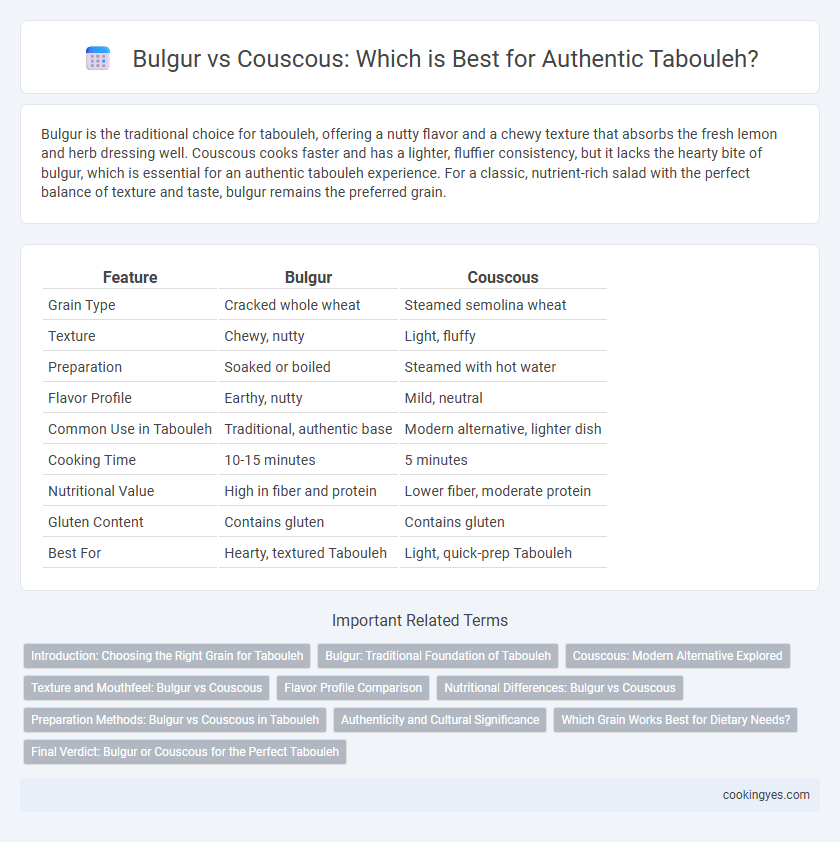Bulgur is the traditional choice for tabouleh, offering a nutty flavor and a chewy texture that absorbs the fresh lemon and herb dressing well. Couscous cooks faster and has a lighter, fluffier consistency, but it lacks the hearty bite of bulgur, which is essential for an authentic tabouleh experience. For a classic, nutrient-rich salad with the perfect balance of texture and taste, bulgur remains the preferred grain.
Table of Comparison
| Feature | Bulgur | Couscous |
|---|---|---|
| Grain Type | Cracked whole wheat | Steamed semolina wheat |
| Texture | Chewy, nutty | Light, fluffy |
| Preparation | Soaked or boiled | Steamed with hot water |
| Flavor Profile | Earthy, nutty | Mild, neutral |
| Common Use in Tabouleh | Traditional, authentic base | Modern alternative, lighter dish |
| Cooking Time | 10-15 minutes | 5 minutes |
| Nutritional Value | High in fiber and protein | Lower fiber, moderate protein |
| Gluten Content | Contains gluten | Contains gluten |
| Best For | Hearty, textured Tabouleh | Light, quick-prep Tabouleh |
Introduction: Choosing the Right Grain for Tabouleh
Bulgur and couscous both serve as popular bases for tabouleh, but bulgur offers a nuttier flavor and chewier texture that complements the fresh herbs and vegetables more authentically. Bulgur, made from cracked wheat, retains more fiber and nutrients compared to couscous, which is a finer semolina pasta. Choosing bulgur enhances the traditional taste and nutritional profile of tabouleh, making it the preferred grain for this Levantine salad.
Bulgur: Traditional Foundation of Tabouleh
Bulgur, made from cracked and parboiled wheat, is the traditional foundation of authentic tabouleh, providing a nutty flavor and chewy texture essential to the dish's character. Its coarse grains absorb lemon juice and olive oil effectively, creating the refreshing, herbaceous profile that distinguishes tabouleh from other salads. Unlike couscous, bulgur's processing method retains more fiber and nutrients, enhancing both the dish's health benefits and authenticity.
Couscous: Modern Alternative Explored
Couscous offers a modern alternative to traditional bulgur in tabouleh, providing a lighter texture and quicker preparation time that appeals to contemporary kitchens. Made from semolina wheat, couscous absorbs flavors effectively while maintaining a fluffy consistency that contrasts the chewy bite of bulgur. This versatility enhances tabouleh's fresh ingredients like parsley, mint, and tomatoes, making couscous a popular choice for innovative Mediterranean recipes.
Texture and Mouthfeel: Bulgur vs Couscous
Bulgur offers a chewy and slightly nutty texture that adds a hearty mouthfeel to tabouleh, enhancing its traditional freshness and crunch from herbs. Couscous, with its finer, softer granules, provides a lighter, fluffier base that absorbs flavors quickly but may lack the distinct bite bulgur delivers. Choosing bulgur emphasizes a rustic, satisfying chewiness, while couscous yields a delicate, smooth texture that shifts the overall mouthfeel of tabouleh.
Flavor Profile Comparison
Bulgur offers a nutty and slightly chewy texture that complements the fresh herbs and citrus in tabouleh, creating a more traditional and robust flavor profile. Couscous has a milder, neutral taste with a softer, fluffier texture that absorbs the salad's lemon and olive oil flavors but lacks the distinctive earthiness of bulgur. Choosing bulgur enhances the authentic tabouleh experience with its hearty grain notes, while couscous provides a lighter, more subtle base for the dish.
Nutritional Differences: Bulgur vs Couscous
Bulgur contains higher fiber content and more protein compared to couscous, making it a more nutrient-dense option for tabouleh. Bulgur is also richer in minerals such as iron and magnesium, contributing to better digestion and sustained energy release. Couscous, typically made from refined semolina, has a lower glycemic index but offers fewer vitamins and antioxidants than whole grain bulgur.
Preparation Methods: Bulgur vs Couscous in Tabouleh
Bulgur is commonly used in traditional tabouleh and requires soaking in cold water for about 20-30 minutes or briefly boiling to soften, preserving its chewy texture and nutty flavor. Couscous cooks quickly by steaming or soaking in hot water for 5-10 minutes, resulting in a fluffier and lighter grain, though it lacks the distinct chewiness of bulgur. The choice between bulgur and couscous impacts the tabouleh's texture and authenticity, with bulgur favored for maintaining the salad's characteristic bite.
Authenticity and Cultural Significance
Bulgur is the traditional grain used in authentic Tabouleh, prized for its nutty flavor and chewy texture that enhances the salad's fresh herbs and lemony dressing. Couscous, often mistaken for bulgur, is a pasta made from semolina and lacks the cultural significance deeply rooted in Levantine cuisine. Choosing bulgur over couscous preserves the genuine taste and honors the cultural heritage of Tabouleh as a staple in Middle Eastern gastronomy.
Which Grain Works Best for Dietary Needs?
Bulgur, made from cracked wheat, is rich in fiber, protein, and essential minerals, making it a superior choice for those seeking high nutritional value and digestive health benefits in tabouleh. Couscous, typically made from semolina, has a lighter texture but offers fewer nutrients and less fiber, which may be less ideal for individuals needing higher fiber intake or managing blood sugar levels. For dietary needs prioritizing whole grains and nutrient density, bulgur is the optimal grain for authentic, health-conscious tabouleh preparation.
Final Verdict: Bulgur or Couscous for the Perfect Tabouleh
Bulgur offers a traditional texture and nutty flavor essential for authentic tabouleh, enhancing the salad's freshness and herbaceous notes. Couscous, while quicker to prepare and softer in texture, tends to absorb flavors differently, making it a suitable alternative but not a perfect match for classic recipes. The final verdict favors bulgur for an authentic tabouleh experience, preserving its characteristic chewiness and balanced taste.
Bulgur vs Couscous for Tabouleh Infographic

 cookingyes.com
cookingyes.com